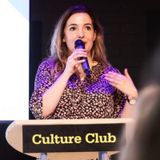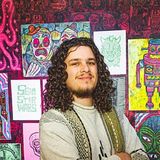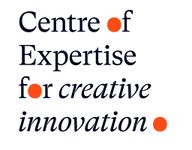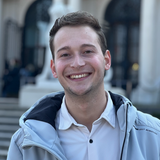Please note that the physical spots have been fully booked. Check this web page regularly as there might be last minute cancellations. Also, you can still register to watch online!
The last few years are characterised by the rise of AI, and its impact is felt among various human industries, especially within creative fields. Generative AI is criticised by many for allegedly replacing human jobs. Quite notably, discussions have arisen on AI art and its ability to replace artists, making AI as a means for creativity a rather controversial issue. During this evening, we will explore how generative AI can enhance and support human creativity rather than replace it. We’ll highlight both successful applications and challenges within the creative industries, addressing ethical dilemmas and sustainability issues. Additionally, the evening aims to identify essential regulations, strategies, and standards that creatives and policymakers must develop collaboratively to navigate the future responsibly and effectively.





About the speakers
Tessa Mei Duzee is an experienced lecturer and researcher in digital technology and ethics at the Amsterdam University of Applied Sciences. In recent years, she developed the Ethical Toolkit, featuring innovative teaching methods on the ethics of digital platforms. Her work is driven by a strong interest in questions surrounding artificial intelligence, particularly what is legally permissible and what is ethically desirable. She is currently developing an online course for professionals in the creative industry focused on generative AI, ethics, and the law.
Harm Hofmans is Head of Education and Program Developer at MU Hybrid Art House, Harm Hofmans shapes exhibitions and learning experiences that blur the boundaries between art, technology, and everyday life. With a global network of creative thinkers, MU invites visitors to imagine the future through the tools we’re creating today. He’s fascinated by human hubris—especially in the face of rapid technological advancements and the (re)discovery of other forms of intelligence. Most recently, in Poetics of Prompting—an exhibition developed with The Hmm—MU explored what it means to write with machines rather than as machines. The project is -among other things- about reclaiming creativity in a world increasingly shaped by algorithms. As an art educator, marketeer, speculative thinker, and—occasionally—flâneur or philosopher, Hofmans wanders through uncanny valleys, explores the overlooked corners of popular culture, and finds joy in declaring all science fiction.
Joao Loupatty is a multidisciplinary visual storyteller and teacher based in Utrecht. He is a teacher at the University of Applied Sciences Amsterdam and focuses on design, ethics, and technology. With a background in graphic design and artificial intelligence, he combines analog and digital techniques—such as 3D animation and AI—to explore themes like futurism, cultural identity, and decolonization. Drawing from his Moluccan heritage, Loupatty examines how colonial narratives and biases persist in contemporary technologies. His work highlights underrepresented perspectives and treats cultural symbols with care, blending nature, culture, and speculative futures to reimagine and revive ancestral stories.
Constant Brinkman is a creative entrepreneur, AI enthusiast, and innovator in the intersection of technology and art. As the Co-Founder and Director of Dead End Gallery in Amsterdam, the world’s first AI-driven art gallery, he has been at the forefront of exploring and showcasing the possibilities of artificial intelligence in the creative arts. Brinkman is also a seasoned event organizer, having hosted numerous lectures, keynotes, and events focused on AI, including the AI Movie Filmfest Amsterdam.
Flavia Dzodan is Lector and head of the research group Algorithmic Cultures at the Rietveld Academie / Sandberg Instituut in Amsterdam, where she also teaches in the MA in Design. Her interdisciplinary practice spans theory, video, micro-publication, and computational aesthetics, focusing on the algorithmic residues of colonial taxonomies and the infrastructures that govern affect. Dzodan’s recent work, This Haunted House Where I Doomscroll, explores algorithmic aesthetics through AI-generated chimeras, speculative video works, and audiovisual installations that address algorithmic violence, predictive exhaustion, and vital austerity. Her research mobilizes recursion, hauntology, and affective latency to resist the procedural legibility and epistemic austerity of both computational systems and contemporary art institutions. She is currently preparing Five Views in Thirteen Years, a time-limited exhibition on infrastructural latency and the failure of cultural futurities.
About the moderator
Mark van der Gun is a philosopher specialised in artificial intelligence and a lecturer at the Amsterdam University of Applied Sciences, where he teaches in the Smart Media Production program. He helps students create media using AI and smart technologies, with a strong focus on the ethical side. Mark sees a lot of opportunities in AI, but also warns against potential risks – e.g., oppression and (power) inequality. He emphasises the importance of critical thinking: “Is AI truly needed here, or might I (still) be better off doing this myself?”








